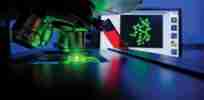Scientific American
Articles written for the GLP list the source as Genes and Science. All other articles were written for the sources noted with excerpts provided by the GLP.
Fewer infants test positive for the coronavirus. Understanding why could help all of us
The initial data suggest that infants make up a small fraction of people who have tested positive for COVID-19. A ...
Back to normal by Christmas? By spring? COVID-19 eludes timelines
Many prominent business and political leaders downplayed the pandemic in its early stages. As a result, most business owners and ordinary citizens initially perceived ...
World War II Jewish Warsaw ghetto in provides blueprint for how US might contain coronavirus
A paper published on [July 24] in Science Advances reports on a sophisticated mathematical analysis that shows how personal hygiene, quarantines, social distancing and ...
Gene-edited crops that ‘communicate with environment’ could launch next green revolution
Researchers at the Institute of Network Biology in Germany and their colleagues .... published a study in Nature showing that ...
Pangalactic intelligence: Here’s a guess about how many aliens in the universe
[I]n excess of four billion years ago, practically as soon as our planet had sufficiently cooled from its fiery formation, ...
Infographic: Power of evolution? How oak trees came to dominate North American forests
Over the course of some 56 million years, oaks, which all belong to the genus Quercus, evolved from a single undifferentiated ...
What brain wiring has to do with cognitive differences in humans and other animals
A persistent question about [brain] connectomes has to do with what, if anything, distinctive wiring patterns have to do with ...
Viewpoint: Telescoping coronavirus vaccine testing and approval timelines exposes all of us to unnecessary dangers
We all hope for a rapid end to the pandemic and an effective vaccine would be a surefire solution. But ...
Human hibernation? Brain ‘snooze button’ could help astronauts survive long-term space travel
The mechanisms that control torpor and other hypothermic states—in which body temperatures drop below 37 degrees Celsius—are largely unknown. Two ...

Brain stimulation could help you get stronger, faster
[Halo Neuroscience CEO Brett Wingeier] said that they make a headset which stimulates your brain to help you get better, ...
How ancient fish fins gave rise to modern human hands
In 1859 Charles Darwin remarked… in On the Origin of Species: “What can be more curious than that the hand ...
Infographic: How COVID-19 invades the body, step by step
The newest coronavirus, SARS-CoV-2, has created a far deadlier pandemic in part because once it infects a person it can ...

Why do some scents trigger powerful memories?
Anecdotally, many of us have had experiences where a certain smell—perhaps chlorine, fresh baked cookies, or the salty beach air—floods ...

Are there benefits to exercising while sick?
According to the American College of Sports Medicine (ACSM), for the majority of fitness enthusiasts engaged in 30-60 minutes of ...
Mindfulness relieves labor pain, improves postnatal recovery
Research has shown that even under extreme circumstances, like during childbirth, we can (and should) practice mindfulness. Of course, it ...
Symphony of scents: Why do flowers smell different from rotting fish?
In the deep recesses of the nose are millions of sensory neurons that, along with our eyes and ears, help ...
Motivation complex: What explains that extra burst of energy as we near completing a goal or task?
Whatever it is you’re striving to achieve, science shows you’re likely to push harder the closer you feel to the ...
How COVID-19 works to destroy our sense of smell
[A]nosmia [loss of sense of smell] seen with COVID-19 is present in 30–98 percent of infected people seen in hospitals, ...
Viewpoint: We still don’t know how deadly COVID-19 is—and why it doesn’t really matter
We’ve learned an incredible amount about the novel coronavirus these last few months… But we’re still struggling to answer what ...
Ignorance is bliss? Why people prefer to remain unaware of potentially unpleasant but useful information
A study of more than 2,000 people in Germany and Spain by Gerd Gigerenzer of the Max Planck Institute for ...
Infographic: Deadly opioid overdoses are way more common than we think
Researchers looked at data from the Centers for Disease Control and Prevention on about 630,000 people who died of drug ...

Viewpoint: Genetics research was supposed to change human health. Is it time to reconsider investments in the field?
Since its birth 30 years ago, proponents of the Human Genome Project have promised that genetics research would yield untold ...
The problem with winter: Indoor heating creates an easy pathway for coronavirus to spread
It is obvious that in winter, indoor heating causes a difference between indoor and outdoor temperature. But what we are ...
Explaining near-death experiences and why they aren’t always ‘blissful’
Near-death experiences, or NDEs, are triggered during singular life-threatening episodes when the body is injured by blunt trauma, a heart ...

‘Cognitive technologies’: Automated supply chains could alleviate pandemic-fueled food shortages
As the coronavirus crisis takes a massive toll on global markets, officials are increasingly raising alarms about the food supply ...
How the stigma surrounding addiction keeps people from seeking treatment
Stigma is a problem with health conditions ranging from cancer and HIV to many mental illnesses. Some gains have been ...
We need a quick, cheap test for coronavirus antibodies. It also needs to be accurate
An inexpensive coronavirus test that millions of Americans could use at a pharmacy, in a workplace or even at home ...
Zapping the brain with electrical pulses allows blind patients to ‘see’ letters
Scientists sent patterns of electricity coursing across people’s brains, coaxing their brains to see letters that weren’t there. The experiment ...

